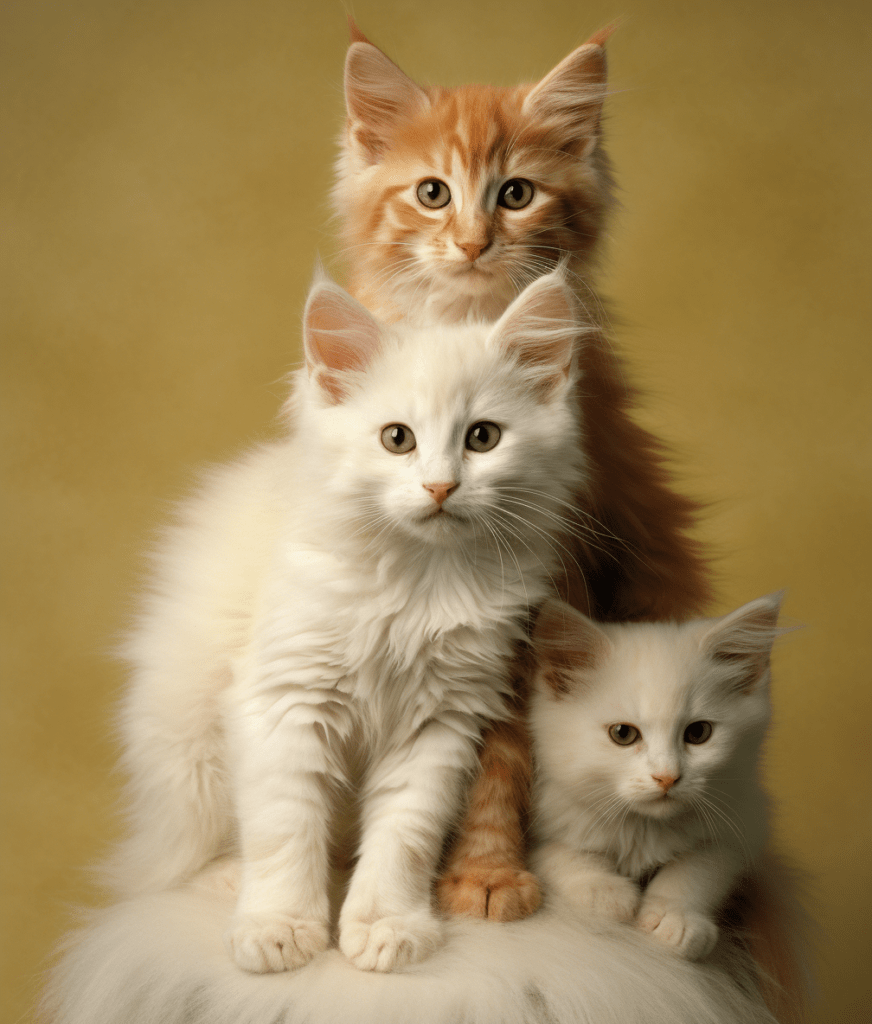
Feline Fables: Debunking the Myth of Cat Suicide
Have you ever heard the phrase "curiosity killed the cat?" While it's a common saying, it's crucial to understand that it's just a metaphor. Cats, like all animals, are driven by instinct and survival. The idea of a cat, or any animal for that matter, committing suicide is a myth that needs debunking.
When it comes to the question, "Do cats commit suicide?", the answer is a resounding no. Cats do not have the cognitive ability to comprehend the concept of death in the same way humans do. They don't ponder existential questions or contemplate the repercussions of their actions on their mortality.
However, it's not uncommon for people to misinterpret certain cat behaviors as signs of suicidal tendencies. For instance, a cat may isolate itself when it's sick or dying. This isn't an act of suicide, but rather an instinctual behavior to hide vulnerability from potential predators.
Understanding cat behavior requires us to step into their world and see things from their perspective. So, let's debunk some of these feline fables and shed light on the truth about cats and suicide.
Understanding Cat Behavior: The Truth Behind the Tales
Let's dive deeper into the world of feline behavior. Cats are enigmatic creatures, their actions often shrouded in mystery. But when we start to understand their instincts and behaviors, we can begin to see the truth behind the tales.
Firstly, it's important to understand that cats are solitary hunters. Unlike dogs, which are pack animals, cats are used to fending for themselves. This solitary nature can often be misinterpreted as aloofness or indifference, but it's simply a part of their survival instinct.
When a cat is sick or dying, it may isolate itself. This is not an act of suicide, but rather a natural instinct to hide their vulnerability from potential predators. In the wild, showing weakness can make an animal a target, so cats have evolved to hide their pain and suffering.
Another common misconception is that cats have nine lives. This myth likely stems from the cat's agility and ability to survive in situations that would be perilous for other animals. But of course, cats do not actually have nine lives. They are just as susceptible to illness and injury as any other animal.
So, why do people think cats can commit suicide? It's likely due to a misunderstanding of cat behavior. When a cat is in distress, it may exhibit behaviors that humans interpret as signs of depression or suicidal tendencies. But these behaviors are usually a response to stress, illness, or grief, not a conscious decision to end their own life.
For example, a cat may stop eating or drinking when it's sick. This can be misinterpreted as a suicidal behavior, but it's actually a common response to illness in many animals. Similarly, a cat may become lethargic or unresponsive when it's in pain or distress. Again, this is not a sign of suicidal intent, but rather a symptom of the cat's discomfort.
In conclusion, while cats may exhibit behaviors that can be misinterpreted as suicidal, these actions are typically driven by instinctual responses to stress, illness, or grief. Cats do not commit suicide. They are simply responding to their environment in the best way they know how.
Understanding cat behavior is a fascinating journey. It requires us to look beyond the myths and misconceptions and see the world from a cat's perspective. So next time you hear someone say that cats can commit suicide, you'll know the truth behind the tale.
The Psychology of Cats: Can They Really Commit Suicide?
Now that we've debunked the myth of cat suicide and explored the truth behind feline behavior, let's delve into the psychology of cats. Can they really comprehend the concept of death? Can they intentionally end their own lives?
The answer, as we've already established, is no. But why is that? To understand this, we need to delve into the cognitive abilities of cats.
Cats, like all animals, have a certain level of cognitive ability. They can learn, remember, and even solve simple problems. But their cognitive abilities are not on par with those of humans. They don't have the ability to contemplate their own existence, understand the concept of death, or plan for the future.
So, when a cat is in distress, it's not contemplating suicide. It's simply reacting to its circumstances in the only way it knows how. Its actions are driven by instinct, not by a conscious decision to end its own life.
But what about the stories of cats refusing to eat or drink when they're sick or grieving? Isn't that a form of suicide? Again, the answer is no. These behaviors are a response to physical discomfort or emotional distress, not a deliberate attempt to hasten death.
In conclusion, while the idea of cat suicide may make for an intriguing tale, it's just that - a tale. The reality is far less dramatic, but no less fascinating. Cats are complex creatures with their own unique behaviors and instincts. Understanding these can help us better care for our feline friends and appreciate them for the amazing creatures they are.
Cat Instincts and Isolation: What It Really Means
As we journey further into the realm of feline psychology, it's time to address another intriguing aspect of cat behavior: their instinct to isolate themselves when they're unwell. This behavior, often misunderstood, can lead to misconceptions about cats and suicide.
When a cat is sick or dying, it may withdraw from its usual activities and hide away in a quiet, secluded spot. This isn't an act of defiance or a sign of suicidal tendencies. Rather, it's a survival instinct deeply ingrained in the feline psyche.
In the wild, showing signs of weakness can make an animal a target for predators. By hiding away, a sick cat is simply trying to protect itself. It's a behavior that has been passed down through generations, a testament to the cat's incredible survival instincts.
But what does this mean for you as a cat owner? It means that if your cat is acting out of character, it's important to pay attention. Changes in behavior, such as increased isolation, could be a sign that your cat is unwell. It's always best to consult with a veterinarian if you notice any significant changes in your cat's behavior.
So, the next time you hear someone say that a cat is acting 'suicidal', remember what you've learned about feline behavior. Cats don't commit suicide. They're simply responding to their circumstances in the best way they know how, guided by instincts honed over thousands of years.
Understanding these instincts and behaviors can help us better care for our feline friends. It allows us to see beyond the myths and misconceptions and appreciate cats for the complex, fascinating creatures they truly are.
Cat Instincts and Isolation: What It Really Means
As we journey further into the realm of feline psychology, it's time to address another intriguing aspect of cat behavior: their instinct to isolate themselves when they're unwell. This behavior, often misunderstood, can lead to misconceptions about cats and suicide.
When a cat is sick or dying, it may withdraw from its usual activities and hide away in a quiet, secluded spot. This isn't an act of defiance or a sign of suicidal tendencies. Rather, it's a survival instinct deeply ingrained in the feline psyche.
In the wild, showing signs of weakness can make an animal a target for predators. By hiding away, a sick cat is simply trying to protect itself. It's a behavior that has been passed down through generations, a testament to the cat's incredible survival instincts.
But what does this mean for you as a cat owner? It means that if your cat is acting out of character, it's important to pay attention. Changes in behavior, such as increased isolation, could be a sign that your cat is unwell. It's always best to consult with a veterinarian if you notice any significant changes in your cat's behavior.
So, the next time you hear someone say that a cat is acting 'suicidal', remember what you've learned about feline behavior. Cats don't commit suicide. They're simply responding to their circumstances in the best way they know how, guided by instincts honed over thousands of years.
Understanding these instincts and behaviors can help us better care for our feline friends. It allows us to see beyond the myths and misconceptions and appreciate cats for the complex, fascinating creatures they truly are.
From Myth to Reality: The Truth About Cats and Suicide
As we've journeyed through the world of feline behavior and psychology, we've debunked some common myths and misconceptions. We've explored the truth behind the tale of cat suicide and discovered that it's just that - a tale. But what does this mean for us as cat owners, lovers, and enthusiasts?
Understanding the truth about cats and suicide is more than just debunking a myth. It's about understanding our feline friends on a deeper level. It's about recognizing their behaviors, understanding their instincts, and providing them with the care and support they need.
When a cat is in distress, it's not contemplating suicide. It's simply reacting to its circumstances in the only way it knows how. Its actions are driven by instinct, not by a conscious decision to end its own life. As cat owners, it's our responsibility to recognize these signs of distress and provide our cats with the help they need.
So, the next time you hear someone say that a cat is acting 'suicidal', remember what you've learned about feline behavior. Cats don't commit suicide. They're simply responding to their circumstances in the best way they know how, guided by instincts honed over thousands of years.
Understanding these instincts and behaviors can help us better care for our feline friends. It allows us to see beyond the myths and misconceptions and appreciate cats for the complex, fascinating creatures they truly are. So let's continue to learn, explore, and appreciate the wonderful world of cats.
Conclusion
As we conclude our spicy journey into the world of feline behavior, we hope you've found this exploration both educational and entertaining. Remember, cats are not capable of contemplating suicide. They are simply extraordinary creatures adapting to their environment in the best way they know how. Here's to celebrating our feline friends and continuing to learn more about their intriguing behaviors!
Frequently Asked Questions
- 1. Do cats understand the concept of death?
- No, cats do not have the cognitive ability to comprehend the concept of death in the same way humans do.
- 2. Can cats intentionally end their own lives?
- No, cats do not commit suicide. Their actions are driven by instinct and survival, not by a conscious decision to end their own lives.
- 3. Why do cats isolate themselves when they're sick or dying?
- This is a natural instinct to hide their vulnerability from potential predators. It's not an act of suicide, but rather a survival instinct.
- 4. What should I do if my cat is acting out of character?
- If your cat is acting out of character, it's important to pay attention. Changes in behavior could be a sign that your cat is unwell. It's always best to consult with a veterinarian if you notice any significant changes in your cat's behavior.
- 5. What is the truth about cats and suicide?
- The truth is that cats do not commit suicide. They're simply responding to their circumstances in the best way they know how, guided by instincts honed over thousands of years.
